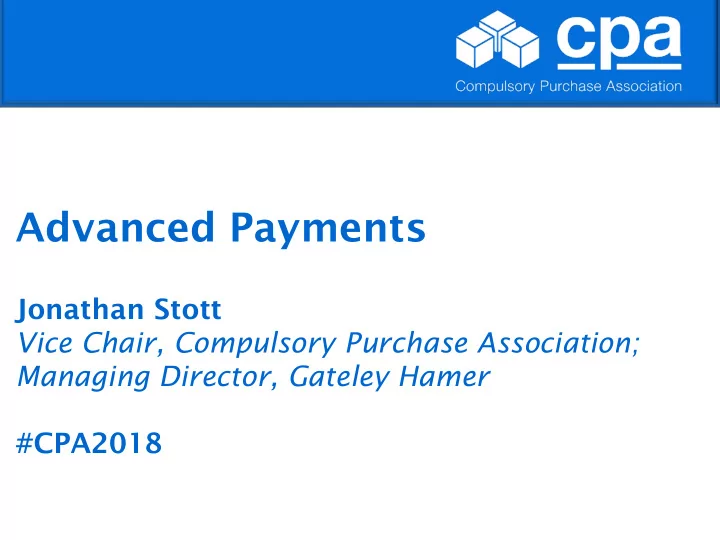

Advanced Payments Jonathan Stott Vice Chair, Compulsory Purchase Association; Managing Director, Gateley Hamer #CPA2018
Advance payments, claim form and interest rates Jonathan Stott MRICS
Advance payments – No longer an oxymoron • Historically, advance payments were only paid when, or after, possession had been taken by the acquiring authority. Useless to a claimant suffering financial hardship. • Amendments to advance payment provisions were introduced through sections 194 and 195 of the Housing and Planning Act 2016. • Under the new provisions payment of advance payments must be made by the date of service of a notice of entry or execution of a GVD, or within two months of a request from a claimant (if later). • This means that a claimant can obtain payment more quickly and – most importantly – in advance of possession being taken.
Advance payments – How the new procedure works • A claimant may submit a request any time after a CPO is confirmed. • An acquiring authority must, within 28 days of receiving a request, decide whether or not it has enough information to estimate the amount of compensation payable. • If the acquiring authority needs more information, it must then require the claimant to provide it. • Within 2 months of the requisite information being provided (or on the date of service of a NTE / execution of a GVD, if later) the acquiring authority is required to pay 90% of its assessment of the compensation. (N.b. only applies to CPOs confirmed after 6 th April 2018) •
Claim form • The new model claim form and associated guidance was published in September 2017. • Intended to be used for all claims, including for temporary possession and s.52 requests. • Intended to streamline the process of claiming and assessing compensation. • The first page is to be populated by the acquiring authority and the remainder by the claimant. • Acquiring authorities are encouraged to issue the claim form at the earliest opportunity: ‘It does not need to wait until it exercises its compulsory purchase powers’. 5
Claim form – points to note • Claimants are encouraged to provide as much information as possible and the form includes a clear warning: ‘ Where information is incomplete or unclear, the Acquiring Authority may not be • able to make a proper assessment of any Advance Payment of compensation to be paid to you’ • However, it is also important to note that the form does not require claimants to provide multiple quotations for disturbance heads of claims, as is regularly requested by AAs. A lack of multiple quotations should not be used as an excuse for AAs to delay making payment. • If claimants do not return a claim form within 21 days of receipt of a NTT the guidance warns that ‘a claimant risks an award of costs by the Tribunal in favour of the AA ’ (s.4 LCA 1961) 6
Interest rates • The Neighbourhood Planning Act 2017 provides for HM Treasury to introduce a new level of interest to be paid on compensation. • Statutory interest is currently running at 0% (being 0.5% below BoE base rate). As such there is no incentive on AAs to pay compensation promptly. • MHCLG recently consulted on the potential for a new rate of interest to be introduced, but raised concerns about claimants potentially ‘gaming’ the system by delaying agreeing compensation or providing account details, and allowing interest to accumulate. 7
Interest rates – CPA response to MHCLG consultation • We do not believe that claimants would generally seek to ‘game’ the system. ‘The Board’s experience is that all claimants, big or small just want to get on with their day to day business’. • We support the proposal for Aas being given the option to make advance payments even where no claim for one has been made (i.e. to reduce the amount of outstanding compensation) and to pay money into court where a claimant has refused to accept a payment. • An interest rate of 4% above base should be sufficient to ensure payment of compensation is not delayed. • Interest should run from the valuation date (as at present) as opposed to from the date that a claim is made. 8
Questions?
Recommend
More recommend